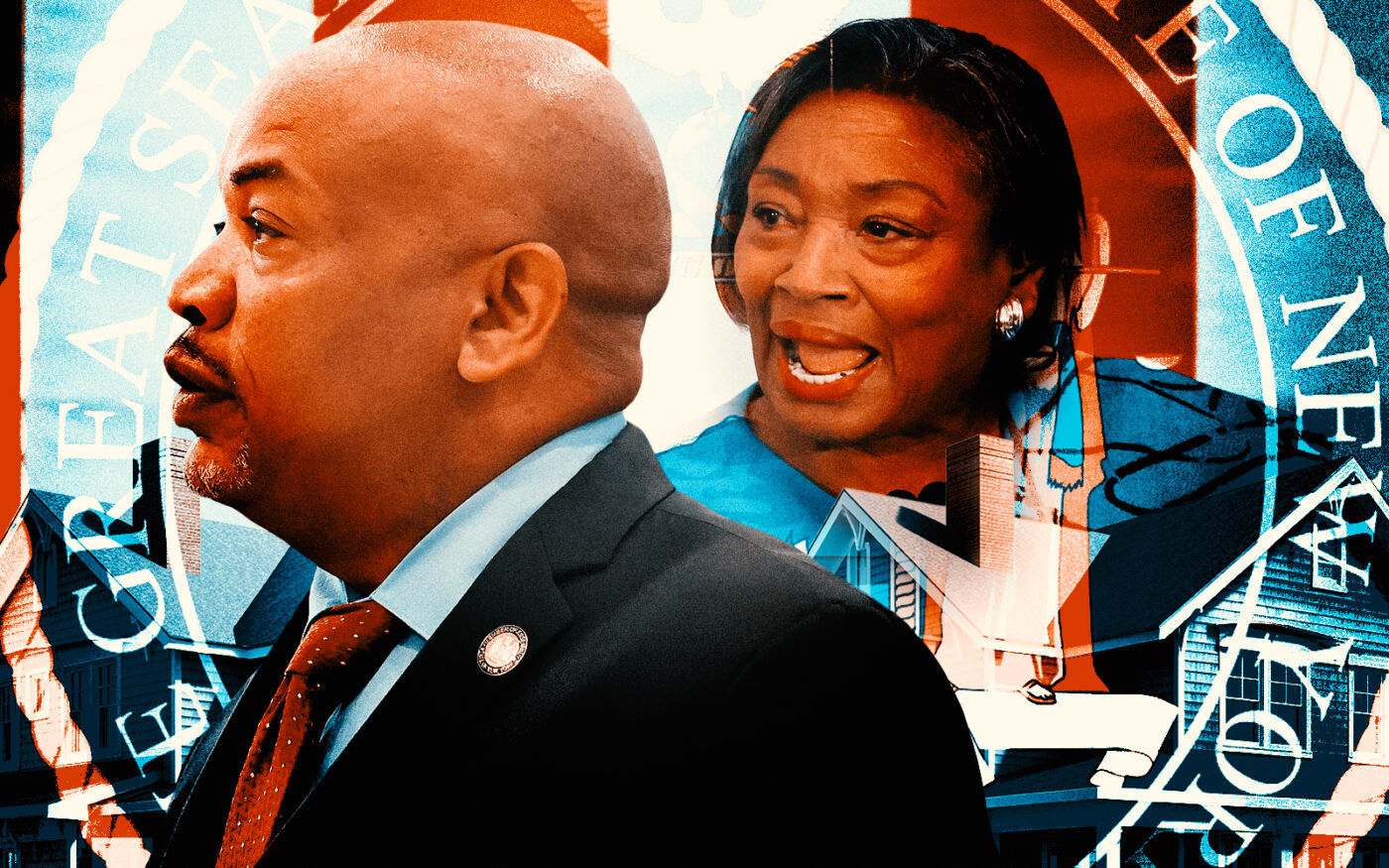The state legislature is doubling down on the governor’s proposal to deter institutional investors from buying single-family homes in New York.
Senate and Assembly Democrats on Tuesday released their responses to Gov. Kathy Hochul’s executive budget, both proposing more restrictions on these investors and higher tax rates for the state’s top earners.
The governor wants to bar institutional investors from bidding on single- and two-family homes for the first 75 days that these homes are on the market. The majorities of both chambers included this proposal in their budget resolutions, but also escalated efforts to kick these buyers out of the market — despite the lack of data on the percentage of single-family homes owned by institutional investors in New York.
The Senate proposal includes a bill sponsored by Sen. Liz Krueger and Assembly member Michaelle Solages, dubbed the End Hedge Fund Control of New York Homes Act. The measure would impose a tax worth 50 percent of the value of a single-family home (defined in the bill as having up to four units) on hedge funds, private equity firms and others when they purchase these properties.
The Assembly’s resolution seeks to discourage entities from scooping up single- and two-family homes. The Assembly has significantly broadened the definition of an institutional investor — characterizing it as someone with a net value of or assets worth $5 million or more, as opposed to the $50 million threshold pitched by the governor. The chamber also wants to increase the waiting period from 75 to 90 days.
The proposal goes even further, establishing a fee equal to 10 percent of the purchase price and granting homeowners automatic protection from investors’ solicitations.
State officials have not, however, been able to provide information demonstrating how prevalent these purchases are in New York.
During a budget hearing last month, RuthAnne Visnauskas, head of the Division of Homes and Community Renewal, said that mayors in Albany, Rochester and other cities have reported that hundreds of homes have been scooped up by such buyers. Visnauskas could not provide data.
Reports have repeatedly pegged the share of single-family homes owned by institutional investors at between 2 and 3 percent, though the percentages are higher in parts of the Sun Belt. A December report by CoreLogic showed mom-and-pop investors made up the lion’s share of so-called investor deals in New York City between January and June, as was the case in the 19 other top metro areas.
Both the Assembly and Senate excluded the governor’s proposal to curb the use of price-fixing software used to set rents.
These resolutions are not binding, but provide a snapshot of each chamber’s priorities heading into budget negotiations. As with the governor’s executive budget, these resolutions do not take any big swings at ramping up housing construction. The Senate proposal indicates that the chamber is “open” to further discussing the Faith-Based Affordable Housing Act, which would make it easier for religious organizations to build affordable housing on their property.
Housing ground rules
In December, Hochul pledged to commit $1 billion to help build housing in New York City. The funds helped secure approval of the City of Yes for Housing Opportunity, which included several zoning changes aimed at making it easier to build an estimated 80,000 new housing units. The governor did not, however, specify how those funds would be divided.
The Senate resolution specifies that a little more than half of that money, spread out over five years, should go to the New York City Housing Authority. The remaining $500 million would be divvied up between various efforts, including $150 million for the construction of new rental housing, $80 million for a mixed-income housing revolving loan fund and $50 million to preserve Mitchell-Lama housing.
The Assembly’s bill doesn’t address how the City of Yes funds should be distributed but calls for increased investments in supportive housing, community land trusts and other housing models.
The Democratic majorities of both chambers once again included $250 million to fund a state-run housing voucher program. The proposal has garnered support from both tenant and real estate groups in recent years, but Hochul has repeatedly refused to back it.
The resolutions do not include much for owners of rent-stabilized apartments, who have urged lawmakers to provide more relief from the 2019 rent law, which severely limited rent increases on these apartments. The state budget last year slightly raised the amount that landlords who renovate apartments can increase rents, but owners argue this will barely make a dent in the level of distress seen across stabilized properties.
The Assembly resolution, however, includes a $275 million tax credit for renters with incomes lower than $200,000. The benefit would be capped at $750.
Higher taxes for millionaires, tax credits for tenants
The governor’s proposed budget called for extending the state’s millionaire’s tax for another five years. The rates, the highest of which is 10.9 percent and applies to those earning more than $25 million, are slated to expire in 2027. The Assembly and Senate proposed extending the tax and increasing the rates, with the Senate pushing an increase of 0.5 percent on the two top tier earners, and the Assembly advocating for increases across the board, with the highest rate becoming 12 percent.
Hochul also floated extending the state’s film production tax credit for two years, as well as pushing the deadline for a tax credit provided to certain businesses that move to locations above 96th Street in Manhattan or the other boroughs. Both the Assembly and the Senate resolutions exclude extensions to the latter, known as the Relocation and Employment Assistance Program.
The two budget resolutions also call for an expansion of the types of projects where developers must pay construction workers prevailing wages. Such wage requirements kick in when project costs exceed $5 million and if at least 30 percent of the project is funded through public money. The Assembly and Senate are pushing to reduce that threshold to 20 percent, and to eliminate a board that was given the authority to determine which projects must pay these higher wages. The head of the Real Estate Board of New York and the Building and Construction Trades Council are members of the board.
In an op-ed for amNY, Gary LaBarbera, president of the New York City and state chapters of the BCTC, said the board is “at its best ineffective and at its worst, a roadblock.” He noted that the board has only approved six projects since it was created in 2022.
Two bills strongly opposed by the real estate industry were not included in the resolutions, including a measure that would cap increases on ground-lease rent at co-ops, nor another that would make it easier for localities outside New York City to adopt rent stabilization.
The budget is due April 1.
Read more



